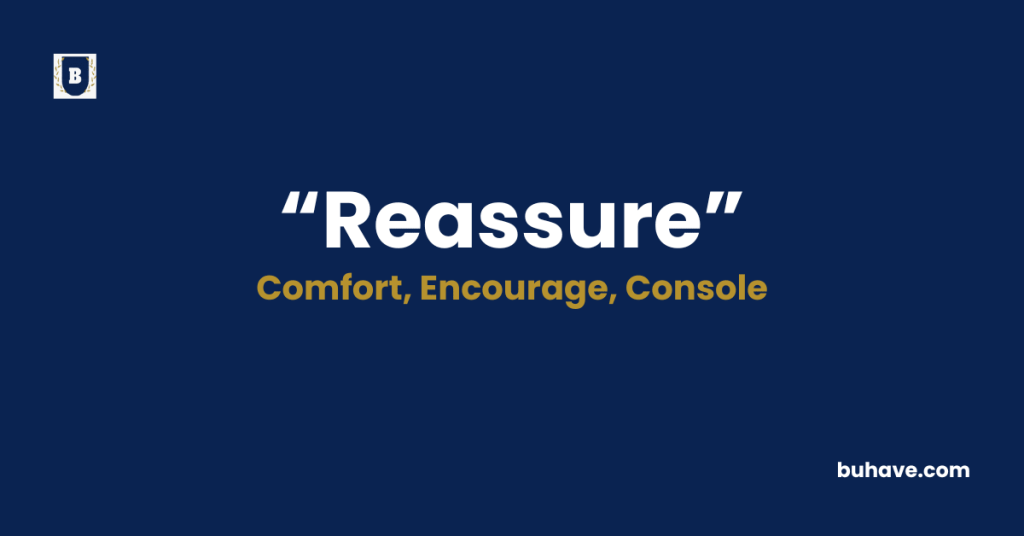The word ‘Reassure’ (Verb) means to restore confidence or comfort in someone by addressing their worries or fears. In this guide, you’ll learn the full definition, synonyms, antonyms, etymology, and real-life examples of how to use ‘Reassure’ correctly in sentences.
Reassure Explained in Depth
A complete and detailed guide to the word Reassure, including meaning, definition, examples, etymology, synonyms, and antonyms.
Meanings of Reassure
Reassure means to comfort someone or make them feel less worried or anxious by providing support, encouragement, or positive information. It involves offering words or actions that calm doubts, fears, or uncertainties.
For example, you might reassure a friend that everything will be okay before an important exam. Similarly, a parent might reassure their child that there’s nothing to be afraid of during a thunderstorm.
Definition
Reassure is a verb that means to say or do something to remove someone’s fears or doubts. It suggests giving confidence, support, or comfort in the face of worry or uncertainty.
Etymology
- The word reassure comes from the Old French rassurer, meaning “to restore confidence.”
- It stems from the Latin re- (again) and assecurare (to make safe), which itself comes from securus (secure).
- Over time, it evolved in English to mean comforting someone who is feeling unsure or anxious.
Example Sentences
- She tried to reassure him that everything would work out in the end.
- Parents often reassure their children during thunderstorms by explaining that the noise is just thunder and nothing to fear.
- The doctor reassured the patient that the surgery was routine and that he would recover quickly.
Reassure Synonyms
- Comfort
- Encourage
- Console
- Support
- Calm
- Pacify
- Relieve
- Sooth
- Bolster
Reassure Antonyms
- Alarm
- Discourage
- Worry
- Upset
- Agitate
- Distress
- Terrify
FAQs about Reassure
Here are some frequently asked questions (FAQs) about the word “Reassure”
1. What does “reassure” mean?
“Reassure” means to say or do something to remove someone’s fears or doubts and make them feel more confident or less anxious.
2. Can “reassure” be used in a medical context?
Yes, it is often used when doctors or nurses comfort patients by explaining medical procedures or outcomes in a way that reduces anxiety.
3. Is “reassure” always positive?
Generally, yes. It carries a positive connotation of offering support and calm, rather than stirring fear or worry.
4. How does “reassure” differ from “encourage”?
“Reassure” focuses on removing doubts or fears, while “encourage” means to inspire confidence or motivate someone to continue or try harder.
5. Can “reassure” be used in everyday conversation?
Absolutely. It’s a helpful and polite word that’s used in both formal and informal settings to show you care about someone’s feelings.






